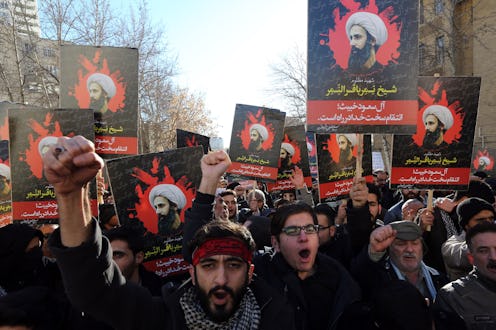News
What Does It Mean To Sever Diplomatic Relations?
The Middle East is undergoing yet another wave of upheaval and instability. On Sunday, Saudi Arabia announced that it's severing diplomatic ties with Iran. The two countries have been regional rivals for decades, and that tension reached a fever pitch earlier in the week after Saudi Arabia executed a popular Shi'a cleric, sparking outrage in Iran. But what does it mean to sever diplomatic ties, and how will this affect Saudi Arabia, Iran, and the U.S.?
First, a bit of backstory. Saudi Arabia is a predominantly Sunni country with Sunni rulers, while Iran is majority Shi'a with Shi'a leaders. The Sunni-Shi'a split has been a source of tension and violence within Islam for over 1,000 years, and largely as a result of this, Saudi Arabia and Iran have long been rivals in the Middle East. On Friday, Saudi Arabia executed Nimr al-Nimr, a prominent Shi'a cleric who had been critical of the Saudi government. In response, Iranians attacked the Saudi embassy in Iran, and now, the two countries are severing diplomatic ties.
The biggest effect of severing diplomatic relations involves the shuttering of embassies. Up until this point, there's been a Saudi embassy in Iran, and an Iranian embassy in Saudi Arabia. Now that the two countries are severing diplomatic ties, however, both countries' respective embassies will be shut down, and the diplomats who work in those embassies will be forced to leave the country.
What does all of this mean? The answer lies in the actual purpose that foreign embassies serve.
Embassies Are A Cornerstone Of Diplomatic Relations
To put it simply, an embassy is a region inside Country A in which citizens of Country B are allowed to freely move and operate. Embassies are useful to both governmental officials and everyday citizens. From the standpoint of policymakers, an embassy allows representatives of your government to maintain a physical presence in another country. This allows you to coordinate with local officials, gather real-time information about the conditions on the ground, monitor any developing political situations, and so on. Needless to say, having these abilities greatly enhances your ability to craft an effective foreign policy.
But embassies also affect regular civilians who happen to be traveling abroad. If you're an American taking vacation in Russia, for example, the American embassy in Russia is your home base. As an American citizen, you'll always be allowed to enter it, and that's a privilege that is not afforded to Russian citizens. That kind of thing comes in handy if, say, there's some sort of international incident between the U.S. and Russia, and American citizens within Russia fear for their safety.
Embassy Closure Hurts Both Politicians & Civilians
The closure of the Iranian and Saudi embassies in each country will have two effects. For one, it's going to be much harder for Iranian leaders to develop an effective foreign policy in Saudi Arabia, and vice versa. Suppose, for example, that Saudi Arabia wanted to gather intelligence on anti-Sunni movements within Iran, and perhaps provide some form of services to Iranian Sunnis — that's going to be pretty hard to do without a Saudi embassy in Iran. It's kind of like trying to buy furniture for an apartment that you're not allowed to actually visit: You might be able to get a basic idea of what kind of sofa you want, but if you can't actually take measurements of the living room, it might not fit.
In addition, the severing of Saudi-Iranian diplomatic ties will also make it more dangerous for Saudi and Iranian citizens to visit one another's country. If you saw Argo, you have an idea of what this looks like. The film is set in 1979-1980 when Iranian protesters stormed the U.S. embassy, and the two countries severed diplomatic ties as a result. As a result, a group of Americans who were in the U.S. embassy in Iran at the time were suddenly in trouble: They had no safe haven, and were trapped in a country that was experiencing strong anti-American sentiment. They ended up taking refuge in the Canadian embassy, Canada being a country that still enjoyed good relations with the U.S. at the time.
This isn't uncommon. Sometimes, a third country will act as an intermediary between countries that don't have diplomatic relations. The U.S. and North Korea don't have diplomatic relations, and so American travelers in North Korea have to go through the Swedish embassy for any concerns. However, as the U.S. State Department makes clear, this isn't a sure bet, because North Korea frequently denies U.S. citizens access to that embassy.
The Effect On The U.S.
Currently, the U.S. maintains relatively good diplomatic relations with Saudi Arabia, and no official diplomatic relations at all with Iran. At this point, it's purely speculative to predict how the severing of Saudi-Iranian ties will affect the U.S.; however, it might be harder for American representatives to operate within Iran, because they'll no longer have access to a friendly country's embassy. On the other hand, it's also conceivable that Iran's fury at Saudi Arabia could take some of the heat off of the U.S. and improve U.S.-Iranian relations, because usually, America is the most popular punching bag in Iran.
In general, countries only sever diplomatic ties when conflict between them becomes very, very acrimonious and distrustful. A lot of people would consider the U.S. and Russia to be global rivals, for example, but there's still a Russian embassy in the U.S., and vice-versa. Saudi Arabia and Iran have never exactly been geopolitical buddies, but they've at least been able to maintain a veneer of respect and cooperation with one another. Now, at least for the time being, that cooperation has gone out the window, and both countries may suffer as a result.
